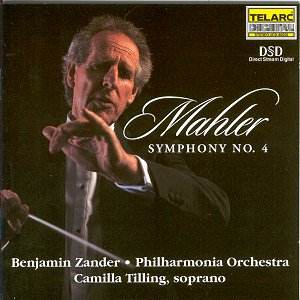There is no question that Benjamin Zander is a committed artist, always trying to find new ways of communicating his love of music to as wide an audience as possible. That is undoubtedly the reasoning behind the 'free' CD which comes as a bonus with this new recording of the Fourth Symphony of Mahler.
First, though, the performance of the Symphony, since that remains the main selling point. It is well played and recorded, as we have every right to expect from the Philharmonia and from the Telarc engineers. The sound has depth, clarity and atmosphere, and the musicians scrupulously observe Mahler's markings with a very skilful corporate and individual effort, as the score demands.
In that case, why is the performance ultimately disappointing? There is, admittedly, nothing much wrong with it, except that it tends to hang fire. The short-term attentions to detail never lead to a longer-term vision, and for whatever reason, Zander doesn't manage to communicate his love of the music into a burning intensity of vision in terms of the performance. Quite the opposite in fact - if anything, this is a prosaic Mahler Four. The music never catches hold, even when it might. The most successful movement is probably the second, in which Christopher Warren-Green's violin solo, tuned up to represent a village fiddler (alias the devil), is expertly played and brilliantly characterised.
The soprano soloist in the finale is Camilla Tilling, and her voice always sounds appropriate to the role of delivering 'the child's view of Heaven'. But Zander sets a sluggish pulse at the beginning, and the movement never quite recovers. Mahler's Fourth is arguably his most lovable symphony, but this isn't its most loveable recorded performance.
As for Zander's introductory talk, the careful planning brings
many useful pointers into the music and its nature. But this talk never
takes off in the way that a Leonard Bernstein talk could. The opening
gambit, of starting with music from the Mozart Piano Concerto in G,
which Zander heard in the first half of the concert which contained
his first experience of the Mahler, doesn't really work. Instead, it
simply sounds as though the wrong disc has been included, and it is
some time before the truth emerges.
Terry Barfoot

![]() Camilla Tilling (soprano)
Camilla Tilling (soprano)
![]() TELARC CD-80555 [CDs:
58.06; 79.00]
TELARC CD-80555 [CDs:
58.06; 79.00]